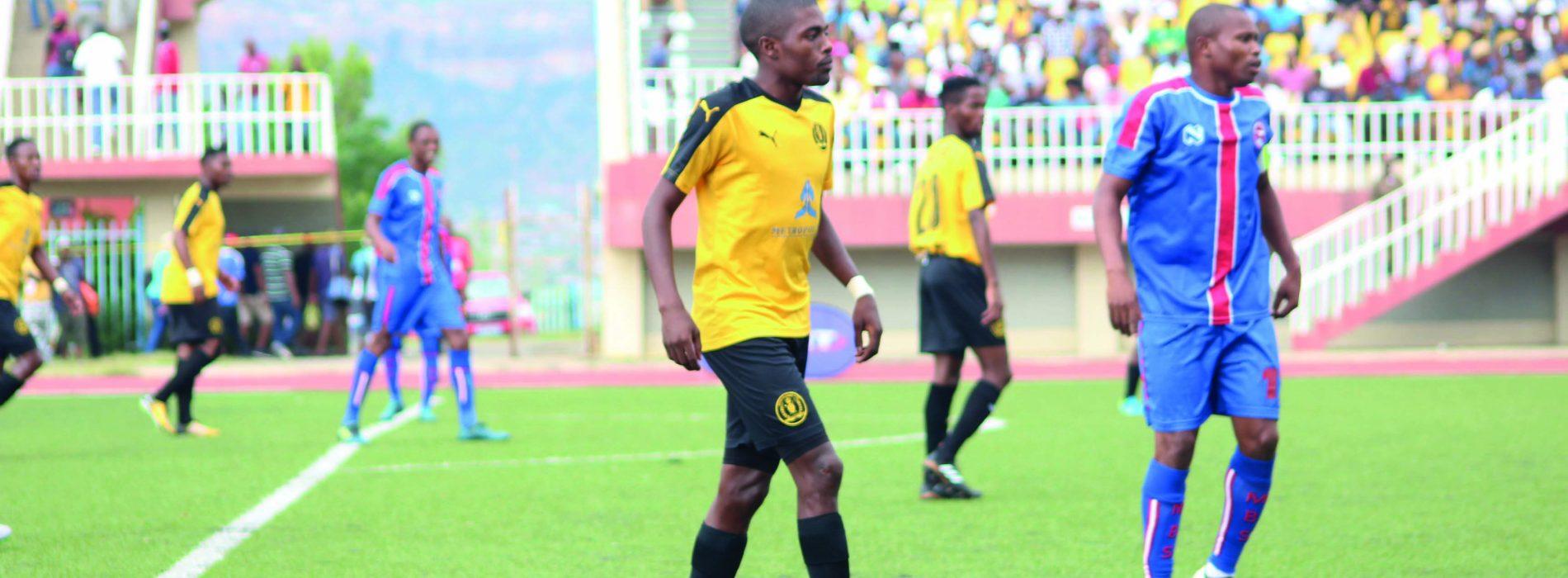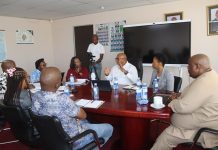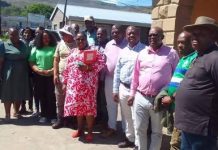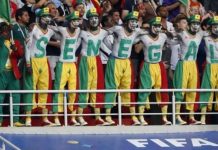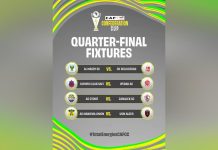Africa-Press – Lesotho. WHAT started as a routine complaint over the registration of football players has triggered a full-blown investigation into the rot in Lesotho’s football and immigration. The main target of the investigation is Bantu FC, the team that has dominated the premier league in recent years.
It turns out that the success could have been driven by the use of South African players the team has registered as locals to circumvent international football transfer regulations.
To do that Bantu FC seems to have used some senior officials at the Ministry of Home Affairs to rig the national registration system so the players appear to be Basotho nationals.
Using that elaborate scheme Bantu FC was able to register nine foreign players instead of the five allowed by local football regulations. Five were registered as foreigners while the other four got local documents.
That meant Bantu had almost another complete team made up of foreign players, giving it an unfair advantage against other teams that had only five foreign players allowed by the regulations.
Some people privy to the operations of teams in the league say the rot could be much wider. The players have Lesotho passports, birth certificates and Identity Documents (IDs).
Those documents are authentic but it is how they were acquired that is now the subject of an investigation by the police and the Lesotho Football Association (LEFA). Documents from South Africa’s Home Affairs department show that the four have Birth Certificates and IDs that prove they are South Africans.
There is also a plethora of documents from the South African Football Association (SAFA) showing that they were registered with the South African teams as South Africans.
Although there is no concrete evidence as yet, it appears that the Premier League Management Committee which is chaired by John Leuta might be, by omission or commission, complicit in the scam. Leuta is also the chairperson of Bantu FC.
The committee seems to have facilitated the registration of the players despite that they did not have international transfers and were being registered as Basotho when they have South African documents.
The matter started unravelling in December last year when Lioli FC complained about the Bantu FC players to the local football court. Lioli’s complaint, filed on December 18, a day after the match, centred on Itumeleng Kenneth Falene, Pheko J ‘Molaoa, Thabo A Sedila and Matsipa I Phumoha.
The four have been key players for Bantu in the last two seasons. All were registered with Hunters FC, a team that plays in the ABC Motsepe League. Last Friday the court issued a robust and chilling judgement against Bantu FC, finding that the team had indeed cheated the football and immigration regulations to register the South Africans as locals.
The court said there was irrefutable evidence that the players were South Africans registered with South African teams and did not have international transfers to play for Bantu FC.
The court said LEFA’s national executive committee should investigate the matter so that “if there is any illegality riddling the obtaining of the national identity documents then the culprits must be brought to book”.
“If this kind of behaviour is not curbed at this early stage the Association will certainly face dire consequences,” the court said. It warned that the scandal could bring LEFA and Lesotho’s football into disrepute.
By that the court seems to have been warning that if the practice is not curbed LEFA might attract the wrath of Fifa, the international football administration body that has a no-nonsense attitude towards cheating.
There is a real possibility that Lesotho might be suspended from participating in international football competitions. Bantu FC will be dogged three points which will be awarded to Lioli FC.
Yet it remains to be seen what will happen to the previous trophies it won using the same illegally registered players. It is not clear how its other victories against other teams this season will be treated.
If all other teams file similar complaints based on the judgement, the consequences for Bantu FC might be dire, if not catastrophic. This is not the first time that Bantu had been accused of using illegal players.
Likhopo FC also filed a complaint with the same court but its case crumbled because it did not have enough evidence. Matlama too tried to fight Bantu over the players but eventually abandoned the case.
The court found that Lioli has managed to prove its case beyond reasonable doubt by providing irrefutable evidence. In the judgement the court merely mentions this evidence but does not avail it to the public.
thepost now has all the evidence that was presented to the court. The paper trail indicates that Bantu had created a well-oiled system to cheat both the football and immigration regulations.
Presented with the local documentation of the players one would think that they are indeed Basotho. They have passports, IDs and birth certificates. One has a baptismal certificate from the New Church of God in Mafeteng.
But this seems to be all part of the chicanery some in the football fraternity suspect has been going on for several years. All the players got their local IDs in 2017.
National Identity and Civil Registration (NICR) director, Tumelo Raboletse, could not be reached for a comment as his phone was not being answered. Deputy Minister of Home Affairs, Mofomobe Machesetsa, said the ministry was aware of the case and had asked the police to investigate.
He said they made the request to the police two months ago but they have not received any report on progress made. “I will check with the police tomorrow,” he said. Leuta said Bantu will appeal the judgement.
“The judgement is out we saw it and we accepted it as it is but we are going to appeal and lets just wait and see what the judgement after appeal will say, let’s wait.
These are Basotho players we know them, they played here,” Leuta said. Premier League Management Committee spokesperson, Lekholoa Mosito, the judgement has put the ball in LEFA’s court.
“The judgement actually says LEFA should follow through and investigate and take action, LEFA could either act on that or delegate it to us and we will act on it,” Mosito said.
“But if Bantu do appeal we will have to see what the judgement says when it comes back. And the other teams that were complaining, it is now up to them whether they take it forward.
”
LEFA spokesperson Thabo Maretlane said: “We are aware of it and the executive committee is yet to meet and discuss the judgement, for now there is nothing more to say, I would be lying.
”
Itumeleng Falene
Falene’s South Africa ID number is 9112115454088 and he was born on 11 December 1991. He was registered under FC Hunters for the 2015/16 season as a South African and his card number was 442555.
But according to the licence application from Lefa, Falene was registered locally under Van Rooyen United FC, a local team based in Mafeteng. There is no international registration certificate to show that he moved from Hunters FC.
SAFA team sheets show that in the 2015/16 season Falene was playing for Hunters FC as a South African. There is an abridged birth certificate that shows that he is South African.
But Falene also holds a Lesotho ID issued on 24 May 2017. His local birth certificate says he was born in Likhoele but his registration certificate with LEFA states that he was born in Patisi.
Both Patisi and Likhoele are in Mafeteng district where Bantu is based. He got his Lesotho passport on 1 June 2017 and his local ID number is 041235136423. At one time, Falene was called for the Lesotho national team and played in some Cosafa games.
thepost has been informed that last year the player was detained by the South African immigration officers at the Maseru border after they discovered that he was not a Mosotho.
It is not clear how he later managed to enter Lesotho. thepost could not independently verify the allegation. Matsipa Phumoha
Phumoha’s South African ID number is 9302076246082 and documents indicate that he was born on 7 February 1993.
Yet he has a Lesotho Baptismal certificate. Documents submitted to Lefa say he was born in Mafeteng. Bantu registered him on 25 August 2017 as a local player.
There are however other documents that prove that he was registered as a Hunters FC player in the 2015/16 season as a South African. Like Falene, there is no indication that there was ever any international transfer certificate for him.
His Lesotho passport is B0505001. The SAFA system shows that he has been a Hunters FC player since 2012. His registration with LEFA says he was born in Mafeteng.
Pheko ‘Molaoa
There is an abridged birth certificate and ID that show that ‘Molaoa is a South African. He too was playing for the FC Hunters in the 2016/17 as a South African.
This is clearly shown in FC Hunters’ team sheets submitted to SAFA. His Lesotho birth certificate, issued in July last year, shows that he was born at Van Rooyen Gate on 25 July 1994.
Both his parents are Basotho, according to the certificate. ‘Molaoa got his passport (RC532636) on December last year. Curiously the picture on his South African ID looks exactly the same as the one on his Lesotho ID.
How this is possible is not clear because both countries take their own photos when a person applies for an ID. Thabo Selisa (Sedisa)
Selisa’s South African ID and Birth Certificate shows that his real surname is Sedisa.
His middle name, Alfred, however does not appear on his Lesotho passport and birth certificate. Selisa’s South Africa ID number is 8708215473089. In local documents he is known as Thabo Selisa.
The passport he got in December 2017 shows his birth place as Qalabane and his ID number as 057227177727. His passport number is RC532616 but in his application for registration with LEFA he gives it as BA390002.
In the same application his birth place is given as Tsaenolo instead of Qalabane as stated on his passport and birth certificate. Selisa also played for FC Hunters in the 2015/16 season as shown by the team sheets. There is no international transfer for him.

